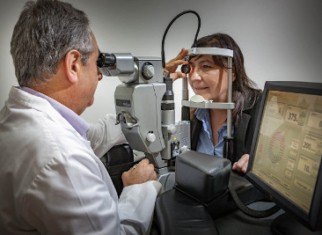
Elderly people are at a higher risk of suffering from age-related macular degeneration (ARMD), one of the leading blindness causes in developed countries.
This disease affects central vision and limits reading and writing abilities, besides causing problems in recognizing faces.
Luckily, there are a few measures that can be undertaken in order to reduce the risk of suffering from this disease and to avoid vision loss:

Several studies have shown that the risk of suffering from ARMD increases with tobacco consumption, as well as the speed at which the disease progresses. Therefore, a smoker has twice the risk of developing ARMD than a non-smoker.

A healthy diet, with low cholesterol and fat consumption and rich in omega-3 fatty acids, can reduce the risk of suffering from ARMD.
Studies show that people who often eat high-cholesterol foods with saturated fat are at a higher risk of suffering from this disease.

If you have close relatives who have developed the disease, you have a 50% chance of developing it as well. Therefore, before attending an eye exam, it is important to talk to your family in order to get to know their medical history and detect the disease early. In such a way, there will be greater chances of saving your vision.

According to several studies, exercising on a regular basis can be beneficial to vision. A specific study has determined that exercising three times a week reduces up to a 70% the risk of developing ARMD exudative form, which is also the most serious form of the disease.

In early stages, ARMD can show no noticeable symptoms. Nevertheless, an ophthalmologist can detect early disease symptoms by means of a comprehensive eye exam.
It is recommended that you have your eyes checked once a year from the age of 40. ARMD is a disease of major incidence in population, but there is still a great lack of awareness. Early detecting the disease not only can reduce its progression, but it can even help save our vision.
Contact us or request an appointment with our medical team.